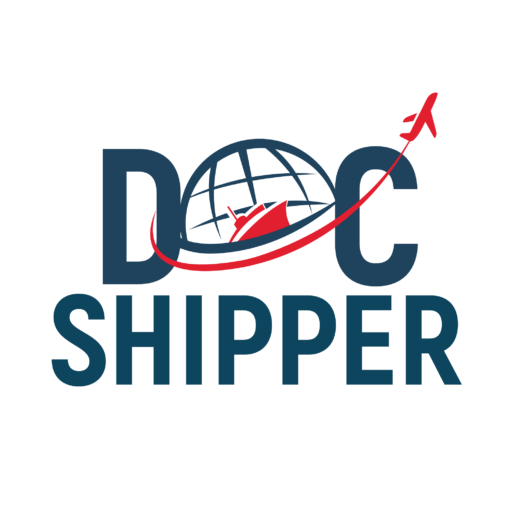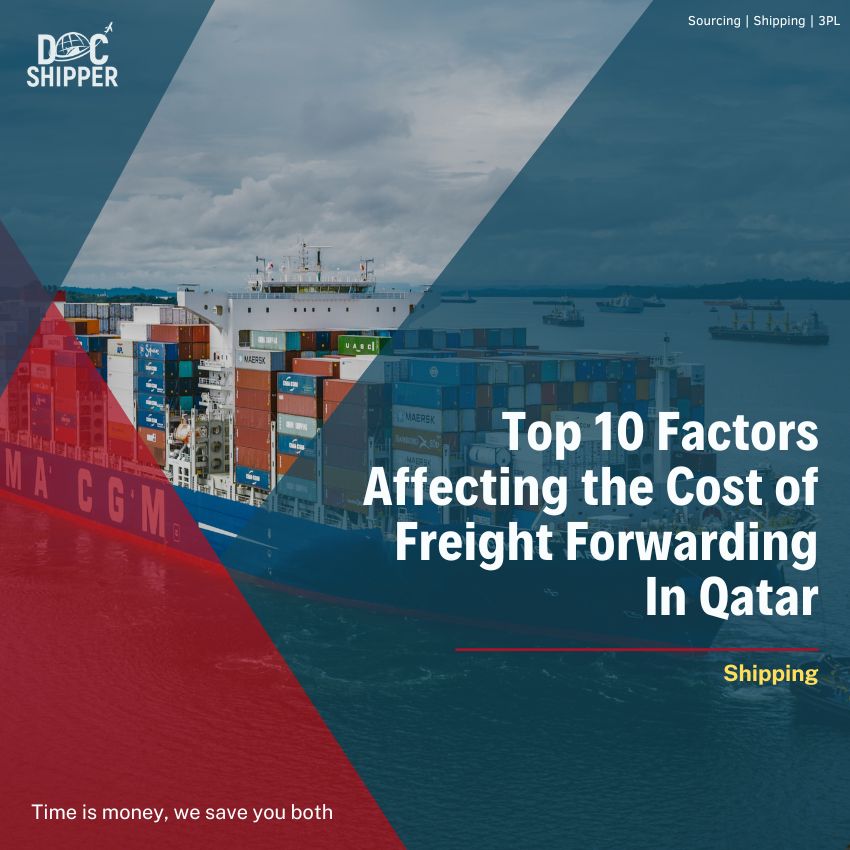As you navigate the complex landscape of international trade, understanding the factors that influence the cost of freight forwarding in Qatar is crucial for your business's success. Unexpected costs can quickly eat into your profit margins, and in a market as competitive as Qatar's, every dirham counts. From fuel prices to customs clearance, numerous variables can impact your shipping expenses. In this article, we'll break down the top 10 factors affecting the cost of freight forwarding in Qatar, empowering you to make informed decisions and optimize your logistics strategy for maximum efficiency and cost-effectiveness.
DocShipper Qatar Services: At DocShipper Qatar, we make shipping easy by handling everything in the import/export process. Our slogan, "Time is money, we save you both!" shows our focus on saving you time and money. We're here to help and guide you all the way.
Interested in our services or need specific info? Our experts can give you a free quote within 24 hours. Have questions? Contact us on WhatsApp today.
1. Fuel Surcharges Apply
For freight forwarders in Qatar, fuel surcharges are an imperative aspect to consider when calculating the cost of shipping goods. These surcharges can significantly impact your overall freight forwarding expenses.
Fuel Price Fluctuations
If you're shipping goods regularly, you're likely aware that fuel prices can fluctuate rapidly. These changes in fuel prices directly affect the cost of freight forwarding, as carriers adjust their rates accordingly. As a result, you may need to factor in additional costs to account for these price swings.
Carrier Fuel Surcharges
Little do many shippers know that carriers often impose fuel surcharges to offset the rising costs of fuel. These surcharges can vary depending on the carrier and the type of shipment.
Surcharges can range from 10% to 30% of the total freight cost, depending on the carrier's fuel surcharge policy. It's imperative to understand that these surcharges are usually calculated as a percentage of the base freight rate. Moreover, some carriers may apply fuel surcharges on a per-kilogram or per-container basis. Be sure to review your carrier's fuel surcharge policy to avoid unexpected costs. By factoring in these surcharges, you can better estimate your freight forwarding expenses and plan your logistics budget accordingly.
DocShipper Tip: Be aware of fuel price changes and carrier surcharges to plan your shipping budget accurately. If you have any doubts, contact us via WhatsApp, and our experts will help you!
2. Customs Clearance Fees
Now, when it comes to customs clearance fees, you need to consider several factors that can impact the overall cost of freight forwarding in Qatar. These fees are an important part of the logistics process, and understanding what they entail is crucial for your business.
Import Duties Imposed
Assuming you're importing goods into Qatar, you'll need to pay import duties imposed by the Qatari government. These duties vary depending on the type of goods, their value, and the country of origin. You'll need to factor in these costs to avoid any surprises during the customs clearance process.
Export Regulations Compliance
On the other hand, if you're exporting goods from Qatar, you'll need to comply with export regulations, which can also impact customs clearance fees. You'll need to ensure that your goods meet the required standards and regulations to avoid any penalties or delays.
This compliance involves obtaining necessary permits, licenses, and certifications, which can add to the overall cost of customs clearance. Failing to comply with these regulations can result in significant fines, penalties, and even shipment delays or seizures. Therefore, it's important to work with a reputable freight forwarder who can guide you through the process and ensure compliance with all regulations.
Both importations and exportations are managed by the Qatar General Authority of Customs and everything must be managed with them.
DocsShipper Advice: We take care of every part of your shipment, including customs clearance. Enjoy a smooth and easy shipping process with us. Contact us now for a free quote and experience hassle-free shipping. A question? Call us via WhatsApp.
3. Distance and Route
While calculating the cost of freight forwarding in Qatar, it's necessary to consider the distance and route of your shipment. These two factors have a significant impact on the overall cost, and understanding how they influence your freight expenses can help you make informed decisions.
Longer Distances Increase Costs
Roads stretching farther translate to higher fuel consumption, increased labor costs, and more wear and tear on vehicles. As a result, longer distances inevitably lead to higher freight costs. When shipping goods over longer distances, you can expect to pay more for fuel, tolls, and other expenses associated with transportation.
Route Optimization Savings
Rationalizing routes can significantly reduce your freight expenses. By identifying the most efficient routes, you can minimize fuel consumption, lower labor costs, and decrease the risk of accidents or delays.
A well-planned route can also help you avoid congested areas, construction zones, and other obstacles that might slow down your shipment. By leveraging technology, such as GPS tracking and route optimization software, you can streamline your logistics operations and save up to 10% on fuel costs. This can add up to significant savings over time, especially for frequent or high-volume shippers like yourself.
4. Type of Goods Shipped
Keep in mind that the type of goods you're shipping plays a significant role in determining the cost of freight forwarding in Qatar. The complexity and sensitivity of your cargo can greatly impact the overall expense.
Specialized Cargo Handling
Even if you're shipping seemingly ordinary goods, certain items may require special handling, such as refrigeration or temperature control. This can add to your overall costs, so it's vital to factor in these requirements when calculating your freight expenses.
Hazardous Materials Fees
One of the most critical factors affecting the cost of freight forwarding is the transportation of hazardous materials. You must comply with strict regulations and safety protocols, which can increase your costs.
Any shipment involving hazardous materials will incur additional fees due to the higher risk involved. These fees can vary depending on the type and quantity of hazardous materials being transported. It's crucial to accurately declare and classify your hazardous goods to avoid delays, fines, or even shipment rejection. Ensure you work with a reputable freight forwarder who has experience handling hazardous materials to minimize risks and costs.
DocShipper Advice: Beyond pricing, familiarize yourself with the legal requirements for your goods, especially if they involve special handling or hazardous materials. For more information, contact us via WhatsApp
5. Mode of Transportation
Many factors influence the cost of freight forwarding in Qatar, and the mode of transportation is one of the most significant ones. The choice of transportation mode can greatly impact your shipping costs, transit time, and overall logistics experience.
Air Freight Premiums
Certainly, air freight is the fastest way to transport goods, but it comes at a premium. You'll pay more for air freight due to higher fuel costs, security fees, and handling charges. Additionally, air freight rates are often subject to fuel surcharges, which can fluctuate depending on global oil prices. If speed is your top priority, be prepared for higher costs.
Ocean Freight Economies
Alternatively, ocean freight is a more economical option for large volumes or heavy cargo. You'll benefit from lower costs per unit and more flexible shipping schedules. For instance, if you're shipping bulky items or large quantities, ocean freight can provide significant cost savings. However, keep in mind that ocean freight transit times are longer, and you'll need to factor in potential delays due to weather conditions or port congestion. Be prepared for longer transit times, but enjoy the cost benefits.
DocsShipper Advice: Did you know? DocShipper Qatar can save you costs by offering the most adapted mode of shipment (air, sea, road, or rail) according to your needs and budget. Contact us to receive a free quote in less than 24 hours. Have a question? Call us via WhatsApp.
6. Weight and Volume
Your shipment's weight and volume play a significant role in determining the cost of freight forwarding in Qatar. The heavier or bulkier your cargo, the more it will cost to transport. Freight forwarders use a combination of weight and volume measurements to calculate the overall size and weight of your shipment, which in turn affects the cost.
Heavy or Bulky Items
Assuming your shipment consists of heavy or bulky items, you can expect to pay more for freight forwarding services. This is because these items require special handling, equipment, and storage, which increases the cost. Additionally, heavy or bulky items may require additional labor, fuel, and transportation costs, further driving up the expense.
Dimensional Weight Charges
Dimensional weight charges are fees applied to shipments based on volume rather than weight. This means that even if your shipment is lightweight if it takes up a lot of space, you may still be charged based on its volume.
This is especially important to consider when shipping items with irregular shapes or those that cannot be palletized. In such cases, the freight forwarder may need to use more space on the truck or container, resulting in higher costs. Be sure to accurately measure your shipment's dimensions to avoid any surprises or additional fees. Furthermore, it's vital to work with a reputable freight forwarder who can help you optimize your shipment's layout to minimize dimensional weight charges.
7. Insurance and Liability
All freight forwarders and shippers need to consider insurance and liability when shipping goods to or from Qatar. This is because unexpected events can occur during transit, resulting in loss or damage to your cargo.
Cargo Insurance Premiums
For instance, you may need to purchase cargo insurance to protect your goods against risks such as theft, damage, or loss. The cost of these premiums will depend on factors such as the value of your cargo, the mode of transport, and the route taken. You should carefully consider the level of coverage you need and the associated costs to ensure you are adequately protected.
Carrier Liability Coverage
Now, when it comes to carrier liability coverage, you need to understand the limits of liability for each carrier. This will determine the amount of compensation you can claim in case of loss or damage to your goods.
It is crucial to note that carrier liability coverage varies depending on the mode of transport and the type of goods being shipped. For example, air carriers typically have lower liability limits compared to ocean carriers. Additionally, some carriers may offer additional liability coverage options for an extra fee. You should carefully review the terms and conditions of each carrier's liability coverage to ensure you are adequately protected.
DocShipper Qatar Insight: We offer tailored insurance solutions to meet your specific needs. Whether you need all-risk coverage or a more specialized policy, our experts can guide you in selecting the right insurance for your cargo. Ensure your goods are protected by contacting us for a free insurance consultation.
8. Warehouse and Storage
Not all freight forwarders in Qatar offer warehouse and storage services, but those that do can significantly impact your overall costs. When choosing a freight forwarder, it's necessary to consider their warehouse and storage options, as they can affect your bottom line.
Short-Term Storage Fees
If you need to store your goods temporarily, you'll likely incur short-term storage fees. These fees are usually calculated based on the volume of goods stored and the duration of storage. Be prepared to pay around QAR 5-10 per cubic meter per day, depending on the freight forwarder and the type of goods.
Long-Term Storage Costs
Some freight forwarders in Qatar offer long-term storage options, which can be more cost-effective than short-term storage. Long-term storage costs are typically lower, but they still vary depending on the freight forwarder and the type of goods.
Fees for long-term storage can range from QAR 20-50 per cubic meter per month. However, be aware that long-term storage can lead to additional costs, such as inventory management fees, security fees, and potential damage or loss of goods. It's crucial to carefully review your freight forwarder's long-term storage options and fees to ensure they align with your business needs. Additionally, consider the benefits of long-term storage, such as reduced transportation costs and increased inventory control. By weighing the pros and cons, you can make an informed decision that suits your business.
DocShipper Qatar Tips: Looking for a reliable warehousing solution? DocShipper Qatar offers top-notch storage facilities tailored to your business needs. Ensure your goods are safe and accessible at all times. Contact us today for a free consultation and discover how we can optimize your logistics.
9. Seasonal Demand Fluctuations
Once again, the laws of supply and demand come into play when it comes to freight forwarding in Qatar. Seasonal fluctuations in demand can significantly impact the cost of shipping your goods.
Peak Season Surcharges
Little do you know, peak seasons such as Ramadan, Eid, and summer holidays can lead to increased demand for freight forwarding services, resulting in higher costs. To mitigate this, freight forwarders often impose peak season surcharges to ensure they can meet the increased demand.
Off-Peak Season Discounts
One way to save on freight forwarding costs is to take advantage of off-peak season discounts. During periods of low demand, freight forwarders may offer discounted rates to attract more business.
Fluctuations in demand can be unpredictable, but being aware of these seasonal patterns can help you plan your shipping schedule accordingly. By shipping during off-peak seasons, you can potentially save on costs, but be sure to check with your freight forwarder for any hidden fees or minimum volume requirements. Additionally, keep in mind that off-peak seasons may also mean longer transit times, so plan accordingly to avoid any disruptions to your business.
10. Port and Terminal Fees in Qatar
Now let's talk about how understanding and planning for port and terminal fees is essential for optimizing your freight forwarding costs in Qatar. Both port and terminal fees in Qatar play a crucial role in determining the overall cost of freight forwarding. When selecting a freight forwarder, understanding these fees is essential to managing your logistics expenses effectively.
Port Handling Charges
Mwani Port, the entity responsible for port operations in Qatar, manages the costs associated with loading and unloading cargo. These charges can fluctuate depending on factors such as the nature and quantity of goods, as well as the specific amenities available at each port. Typically, anticipate fees ranging from QAR 100 to QAR 300 per container, varying based on the port location and service specifications.
Terminal Handling Fees
Terminal handling fees apply to the movement of containers within the terminal facilities. These fees include services like container storage, handling, and documentation processing. In Qatar, terminal handling fees typically range from QAR 50 to QAR 150 per container, depending on the terminal operator and the level of service. By partnering with a knowledgeable freight forwarder who understands local port operations, you can navigate these fees effectively and ensure smooth cargo movements.
DocsShipper Qatar: Ready to simplify your shipping process in Qatar? Contact us today for expert guidance on managing port and terminal fees. Get a free quote and answers to your questions via WhatsApp. Let's optimize your logistics strategy together!
Summing up
On the whole, understanding the top 10 factors affecting the cost of freight forwarding in Qatar is crucial for your business to navigate the complex logistics landscape. You've seen how fuel prices, customs clearance, and cargo insurance, among others, can significantly impact your bottom line. By considering these factors, you can better plan and budget your shipping operations, ensuring that your goods reach their destination efficiently and cost-effectively. With this knowledge, you'll be well-equipped to make informed decisions and optimize your freight forwarding strategy in Qatar.
FAQ | How to choose the best cargo service in Qatar?
What is the significance of fuel prices in freight forwarding costs in Qatar?
Fuel prices play a crucial role in determining the cost of freight forwarding in Qatar. As fuel costs increase, so do the costs of transportation, which are then passed on to customers. Fuel prices can fluctuate depending on global market trends, and Qatar's freight forwarders must adapt to these changes to maintain profitability. A 1% increase in fuel prices can result in a 0.5% to 1% increase in freight forwarding costs.
How does cargo type and volume impact freight forwarding costs in Qatar?
The type and volume of cargo being transported significantly affect freight forwarding costs in Qatar. Bulky or heavy cargo requires specialized equipment and handling, increasing costs. Conversely, smaller volumes of cargo may not fill a container, resulting in unused space and higher costs per unit. Freight forwarders in Qatar must carefully calculate cargo volumes and types to optimize container utilization and minimize costs.
What role does customs clearance play in freight forwarding costs in Qatar?
Customs clearance is a critical component of freight forwarding in Qatar, and its costs can add up quickly. Delays or complications during customs clearance can result in additional fees, fines, and storage charges. Freight forwarders must navigate Qatar's customs regulations and ensure accurate documentation to avoid these extra costs. A single misstep can increase freight forwarding costs by 5% to 10%.
How do peak season and demand fluctuations impact freight forwarding costs in Qatar?
Peak season and demand fluctuations significantly influence freight forwarding costs in Qatar. During peak seasons, such as Ramadan or major festivals, demand for freight services surges, driving up prices. Conversely, during off-peak seasons, freight forwarders may offer discounts to maintain business volumes. Freight forwarders must be agile and adapt to changing demand patterns to optimize costs and maintain customer satisfaction.
What is the impact of security and insurance requirements on freight forwarding costs in Qatar?
Security and insurance requirements are imperative components of freight forwarding in Qatar, but they come at a cost. Freight forwarders must comply with international security standards, such as C-TPAT and AEO, which require significant investments in infrastructure, technology, and personnel. Additionally, insurance premiums can add up quickly, especially for high-value or sensitive cargo. These costs are typically passed on to customers, increasing the overall cost of freight forwarding in Qatar by 2% to 5%.
DocShipper info: Do you like our article today? For your business interest, you may like the following useful articles :
- Getting Your Goods into Qatar: How to Meet Import Requirements
- What is E-Commerce and What Role Does the Field of Logistics Play in Commerce
- How to optimize the customer experience in shipping
- Steps to Start a Transport and Logistics Business
- How to choose the best movers for your international move to Qatar?
DocShipper Advise : We help you with the entire sourcing process, so don't hesitate to contact us if you have any questions!
- Having trouble finding the appropriate product? Enjoy our sourcing services, we directly find the right suppliers for you!
- You don't trust your supplier? Ask our experts to do quality control to guarantee the condition of your goods!
- Do you need help with the logistics? Our international freight department supports you with door to door services!
- You don't want to handle distribution? Our 3PL department will handle the storage, order fulfillment, and last-mile delivery!
DocShipper | Procurement - Quality control - Logistics
Alibaba, Dhgate, made-in-china... Many know of websites to get supplies in Asia, but how many have come across a scam ?! It is very risky to pay an Asian supplier halfway around the world based only on promises! DocShipper offers you complete procurement services integrating logistics needs: purchasing, quality control, customization, licensing, transport...
Communication is important, which is why we strive to discuss in the most suitable way for you!







